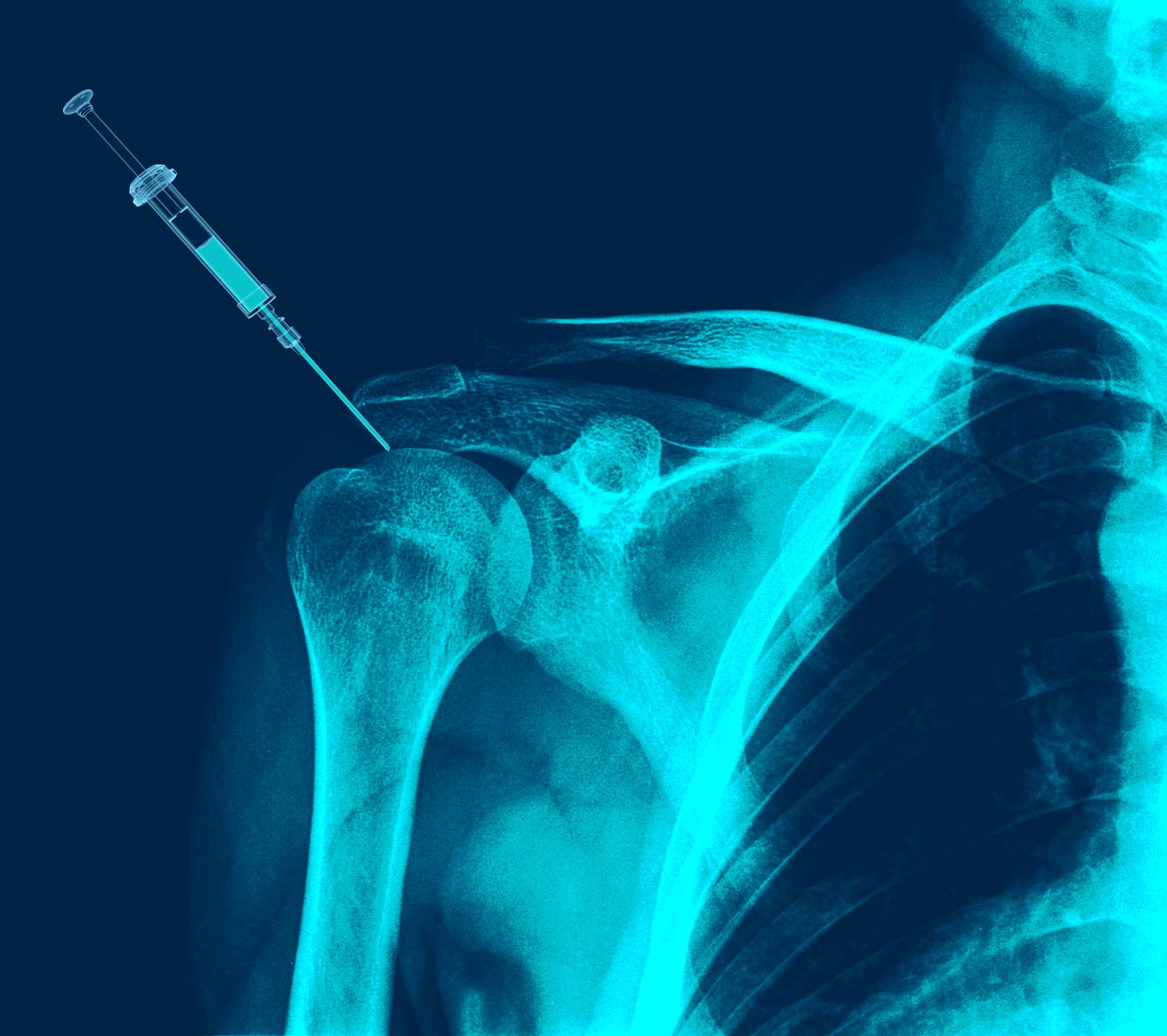
Injections
Because the pleasure of movement is an integral part of good health, treat your pain right away with injections at Medvue.
Injections for pain relief
Injections involve injecting an anti-inflammatory (cortisone injection), a viscosupplement, or a platelet-rich plasma (PRP) injection into the joints, bursae, or tendons to relieve pain and reduce inflammation.
What is an injection?
Injections are performed using a variety of techniques (cortisone injection, arthrography, facet blocks, foraminal blocks) and are used in the treatment of many musculoskeletal problems, including shoulder, knee, back, joint and tendon pain.
Types of injections
Injections offered at the following clinics:
7999, Galeries d'Anjou Blvd, #K001A, Door 7 Montreal (Quebec) H1M 1W9
2000 Le Corbusier Cr Suite 104 Boisbriand (Quebec) J7G 3E8
4105, Matte Blvd, Door F Brossard (Quebec) J4Y 2P4
3030, Le Carrefour Blvd #503 Laval (Quebec) H7T 2P5
1000, Lionel Groulx Street, #102 Sherbrooke, QC J1L 0H5
FAQ
How much does a cortisone injection cost?
The cost of a cortisone injection depends on where the injection is going to be given. To see the price list for our services, click here
How is a cortisone injection performed?
At your visit, the radiologist will disinfect the area to be injected. Using ultrasound or fluoroscopy, the radiologist positions the needle in the area to be treated and injects the medicine. A technician will place a bandage on the treated area; we recommend that you stay in the waiting room for 15 minutes afterwards.
How long does it take for a cortisone injection to work?
Relief is fairly quick. In many cases, there can be significant pain reduction after 3-4 days. Generally, the effects of an injection can be felt within 2 weeks and last for about 3-4 months.
What are the side effects from a cortisone shot?
There are not many side effects or complications with a cortisone injection. Slightly higher blood sugar may be noticed within 2 weeks after the injection. In some cases, an injection into tissue below the skin may cause skin discoloration or atrophy, meaning thinning of the skin. This complication is generally reversible. Very rare complications include an allergic reaction to the product or a post-injection infection. Bleeding is possible but is usually minimal. There may be other complications, depending on the type of procedure.
Can you walk after a foot or knee cortisone injection?
We recommend that you rest for 1-2 weeks, depending on the procedure carried out. We also recommend that you not play sports or run for 1-2 weeks after the procedure.
Can you take anti-inflammatories after a cortisone injection?
We recommend that you not take anti-inflammatory medicines (such as Advil or Naprosyn) within 2 weeks after the procedure. For any injection site pain, you can apply ice for 15-20 minutes every 2 hours.
How often can you get cortisone injections?
We recommend that you wait at least 3 months between injections and that you not have more than 4 injections a year per injection site.
Can you drive after cortisone injection? After a PRP injection?
You are able to drive after an injection. After an injection of platelet-rich plasma (PRP), we recommend you not drive, especially after an injection in your leg. For a PRP injection, patients are asked to bring somebody with them, if possible.
Do you need to rest after a cortisone injection?
We strongly recommend that you limit any physical effort after a cortisone injection. We recommend resting for 1-2 weeks, depending on the procedure, to optimize the injection’s effects and reduce any pain after the procedure.
How long does a cortisone injection last?
The known benefits depend on the type of injection received. For cortisone injections, benefits are felt for 3-4 months or longer. For injections with a viscosupplement or platelet-rich plasma, benefits may last up to 12 months.
Can I work after a shoulder infiltration?
We recommend that you take a few days off before going back to work so the treatment can take full effect. The shoulder is a flexible joint, requiring a shorter recovery time than a fixed joint, like the knee.
Covered by most private insurance
Medvue offers private radiology services. The cost of our MRI scans is not covered by the provincial medical plan (RAMQ), and must be paid for by the individual or company arranging for the exam. It is the patient’s responsibility to verify if their examination is covered by their insurance.
Refund possible with:
- Private insurance policies
- Group Benefit Programs
- Medical tax credits